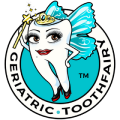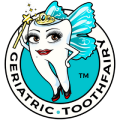As COVID numbers rise again, it’s crucial for medical professionals to focus on protecting themselves from dental aerosols, an often-overlooked safety measure.
As the Geriatric Toothfairy, one of my top priorities is helping dental professionals stay informed, trained, and protected — not just for the sake of their patients, but for themselves and their families. In dentistry, aerosol exposure is real, constant, and risky. Dentists and hygienists are particularly vulnerable because they’re exposed to aerosols more frequently than most other healthcare workers
Dentists and hygienists, in particular, are at high risk of infection from illness and disease due to the fact that they are exposed to aerosols more than most other medical professionals.

What Are Dental Aerosols?
Aerosols are minuscule particles that are light enough to remain airborne for long periods of time and are produced during a lot of different dental operations.
These can pose a big danger to dental professionals as aerosols can very easily enter the respiratory system, even long after the patient is gone.
By following these 3 guidelines, you can help lessen the risk of infection for yourself and your staff.
Sterilize Often and Thoroughly
As dental professionals, we understand the importance of having sterilized instruments and clean examination rooms to keep ourselves and our clients safe.
When managing dental aerosols, it’s crucial to ensure sterilization in all workplace areas, particularly high-traffic spots like door handles, furniture, and bathroom fixtures.
Don’t overlook shared equipment or areas where aerosols might settle. Consider using HEPA filters or UV sterilization in your HVAC system to further reduce airborne contaminants
Wear Proper PPE
Saliva is incredibly dangerous for transmitting bacteria and disease, so it’s critical for dental professionals to wear proper PPE (personal protective equipment) to maintain optimal protection.
Here’s a quick checklist:”
Face shields (especially during high-spray procedures)
Protective eyewear (goggles or safety glasses)
Surgical masks or N95 respirators
Disposable gloves (and replace them frequently)
PPE gowns (single-use or washable, changed between patients)
Avoid Poorly Ventilated Areas
Crowded areas and areas with poor ventilation are hotbeds for disease or bacterial transmission.
Make sure any operating area you are performing work in has the least amount of people in it as possible and is well-ventilated in order to ensure dental aerosols don’t proliferate or become trapped.
Ventilation is often overlooked, but it’s crucial. Aerosols thrive in tight, stagnant environments. Make sure your operatory has proper air exchange, ideally with an external exhaust system or air purification units in place.
At the end of the day, after we take the scrubs off, we have partners, parents, and kids to come home to.
We must stay healthy, not just for our patients, but for ourselves and our families.
Educating and informing staff is essential in keeping everyone safe, which is why providing certified training courses is an essential service we can offer your team.
Our training courses are hands-on with your staff to ensure they’re ready to provide proper care to your clients.
At the end of the day, when we remove our scrubs and hang up our PPE, we return to our loved ones. Protecting ourselves from dental aerosols at work ensures we stay safe at home.
Educating your team on aerosol risks isn’t just good practice — it’s life-saving…”
“Because when we understand the risk, we can rise above it — together.”
In conclusion, protecting yourself from dental aerosols is essential for the safety of both dental professionals and their patients. By sterilizing frequently, wearing proper PPE, and avoiding poorly ventilated areas, you can significantly reduce the risk of infection. It’s not just about keeping your patients safe but ensuring you stay healthy and return home to your loved ones. As healthcare providers, we have a responsibility to educate ourselves and our teams about the risks and the precautions necessary to stay protected. By staying informed and following safety guidelines, we can create a safer work environment and continue to provide excellent care without compromising our well-being. Protecting against dental aerosols is a step toward safeguarding our health, and ultimately, it’s a life-saving measure.


